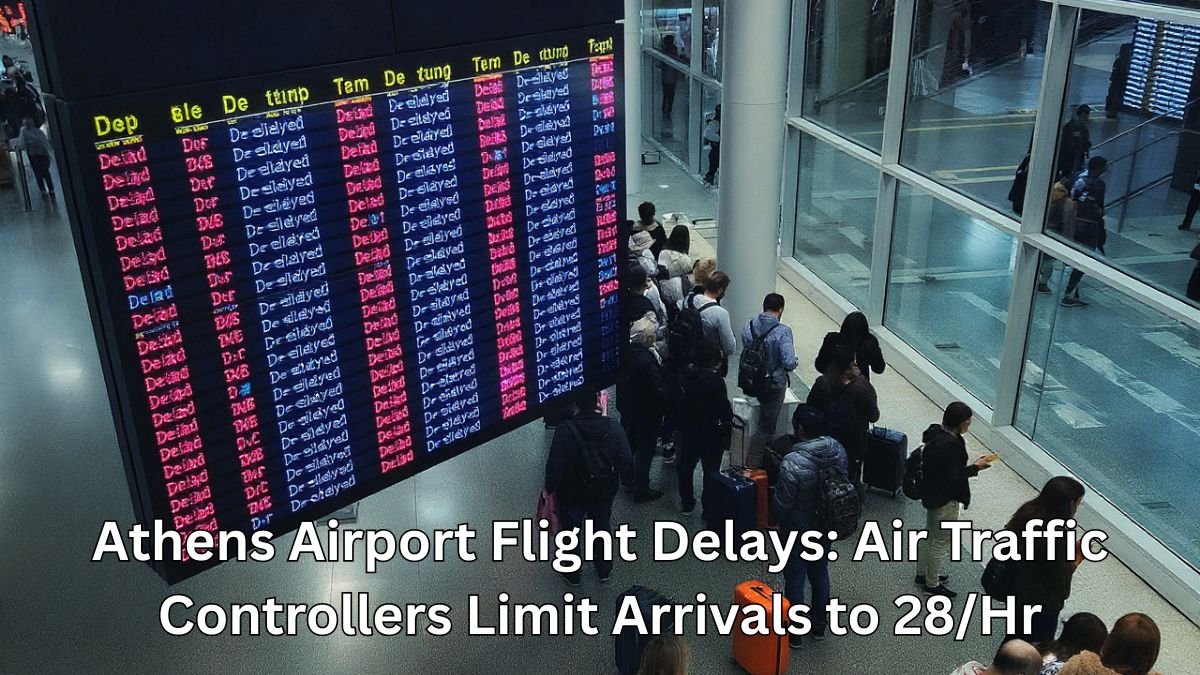Travelers flying to and from Athens International Airport (AIA) are facing frustrating delays this week after air traffic controllers implemented an immediate capacity restriction on the number of flights they will manage per hour. The move, which is a reduction from peak summer traffic levels, has sent a ripple effect of disruption through the flight schedules of all major airlines operating out of the Greek capital.
The air traffic controllers announced the restriction, citing an urgent need to address heavy workload and ongoing flight safety concerns.
The Details: What Is the New Limit?
The new restriction immediately limits the number of arrivals being handled at the airport. Key figures detailing the capacity change:
- New Arrival Limit: Air traffic controllers are now handling a total of 28 arrivals per hour.
- Previous Peak Capacity: This is a reduction from the peak summer season capacity, which reached up to 36 arrivals per hour.
- Impact on Airlines: The Greek airline Aegean Airlines reported that this decision has reduced the airport’s overall arrival capacity by approximately 25 percent.
The consequence of this reduction is being felt by passengers immediately. Early reports from airlines indicate that morning delays of 30 to 40 minutes are already common, with the backlog expected to worsen as the day progresses, potentially translating into delays of two to three hours for some flights.
Escalating Tensions Over Safety and Pay
This capacity slowdown is the latest development in a long-running dispute between the air traffic controllers’ union and the government. Controllers have consistently voiced concerns over outdated systems and the pressure to speed up traffic flows at the expense of safety.
The tension has spilled over into a public spat over compensation:
- Union’s Stance: The union stated that Greek air navigation costs are financed by air navigation charges paid by airlines, not the taxpayer. They contend that in terms of payroll cost per flight hour, they rank 33rd out of 38 providers across Europe, despite ranking high in productivity.
- Government’s Stance: The Greek Minister of Transport and Infrastructure, Christos Dimas, pushed back on the union’s claims, stating that air traffic controllers’ salaries are already high compared to other civil servants. The Minister also pointed out that the government is implementing a comprehensive, 7-pillar action plan to transform the Civil Aviation Authority (CAA) and increase its administrative autonomy.
The air traffic controllers union expressed disappointment with the negotiations, stressing that the attempted misdirection over pay demonstrates a failure to grasp the scale of the real problem, which includes the lack of modern systems.
The move comes after months of criticism from major carriers like Ryanair, which publicly slammed the performance of Greek Air Traffic Control earlier this summer, citing a series of technical failures and staff shortages that have affected thousands of passengers.
Conclusion
While the immediate restriction on flight capacity at Athens Airport is aimed at ensuring safety and managing an unsustainable workload, the result is widespread travel disruption for passengers and a financial headache for airlines. The deadlock between the controllers’ union and the government over infrastructure upgrades and compensation ensures that air travel chaos is likely to continue until a long-term solution is reached. Travelers are strongly advised to check their flight status with their respective airlines before heading to the airport.
Affiliate Disclosure
This article does not contain affiliate links. The information provided is purely for news and informational purposes.
Disclaimer
This article summarizes reported events and public statements. For the most current and official information regarding your travel, including flight status, cancellations, and rebooking options, always contact your airline directly or check the official Athens International Airport (AIA) website.
- Athens International Airport Official Website: https://www.aeroservices.gr/ (Note: Link points to the main operator’s website for general information.)







